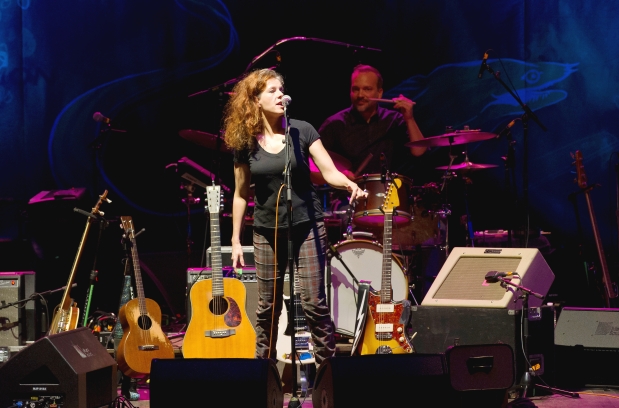SHOW REVIEW: Neko Case at the Orpheum Theatre
Photo credit: Vancouver Sun
Downtown LA’s Orpheum Theatre began its life as a vaudeville venue in 1926 and, like many of the fabulous former movie palaces in the neighborhood, now serves as a rock venue with a grandeur usually not offered to indie bands. On Friday, alongside the elaborate gilded molding and behind the weathered red velvet curtains of the Orpheum’s massive stage, five large, amorphous papier-mache forms were hung from the ceiling. They resembled wasps’ nests made of sedimentary canyon rock; magnificent, somewhat frightening, and out of an unfamiliar but unmistakably natural world.
Such descriptors could as aptly describe the music of Neko Case, who performed at the Orpheum Friday as part of the tour for her 2018 album Hell-On. The opening act was a solo acoustic set by Destroyer’s Dan Bejar, who was also a member of Case’s former band The New Pornographers, and who offered moving stripped-down renditions of his music in his signature affected Bowie-esque drawl. Case’s band, made up of six musicians besides herself, seemed at home in front of the otherworldly sculptures on the magnificent stage, not only because of the aesthetic temperament of their music, but also because of their exuberant ease with one another and the crowd. Case, clad in skeleton leggings with her red hair gently tousled, joshed her bandmates between songs. She had a particularly jovial repartée with Rachel Flotard and Shelley Short, her longtime backing vocalists, who also play guitar on some songs; at one point, drummer Kyle Crane’s repeated attempts at counting in were foiled by Case, Flotard, and Short’s casual joking.
The band’s intermusical banter could scarcely be more different from the music itself. The band’s set was, in typical Case fashion, full of majestically foreboding folk. The third song of the night was “Deep Red Bells,” a track from Case’s 2002 album Blacklisted that addresses the serial killer Gary Ridgway’s predation with unprecedented tenderness and sympathy for the women and girls he killed. “Speckled fawns graze ‘round your bones / who took the time to fold your clothes?” she asks in one couplet. I was struck in the Friday performance by the close harmony of ooohs with which Case, Flotard, and Short end the song, evoking solemn wolf howls. Case’s music is replete with wild animal imagery. On “Last Lion of Albion,” one of the strongest tracks on Hell-On, she issues a paean to extinct creatures: “Last lion of Albion / Last tiger of Tasmania / The last she-wolf to suckle Rome / You’ll feel extinction.” Case’s band is at times reminiscent of a pack of animals in its fierce exuberance, but its musicianship is disciplined and tight. It’s an uncommon joy to see a seven-piece band, complete with organ, pedal-steel guitar, and banjo, perform with such unity and skill.
The distance between Case’s often bleak lyrics, like “Margaret is the fragments of a name /.../ Her jaw aches from wanting and she's sick from chlorine” (“Margaret vs. Pauline”) and her light onstage banter is at times jarring, but Case’s lack of self-seriousness is undeniably charming. On Friday, she followed a performance of Hell-On’s “Winnie” by announcing “that one’s for the pirate ladies” and rambled a bit about the Christmassy sound of Blacklisted’s “Look For Me (I’ll Be Around),” and the creepiness of Christmas, before playing it. Case’s humor between songs makes the poignancy and ominousness of her lyrics all the more powerful, because it’s clear she’s not writing them in the service of cultivating a persona or putting on an act; she is a thoughtful, talented songwriter unafraid of any corner of human experience.
— Lucy Allen, DJ

